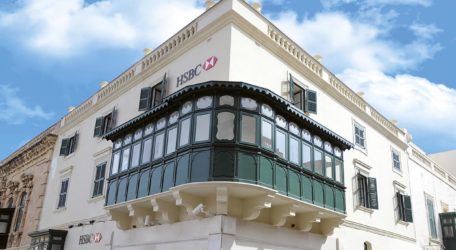
HSBC completes risk management actions, shifts focus to measured growth
The reported profit before tax for the year ended 31 December 2018 of HSBC Bank Malta p.l.c. amounted to €38.6m. This represents a decrease of €11.3m or 23% compared to the previous year. The adjusted profit before tax was €36.5m, a decrease of €19.1m or 34% compared to 2017. The adjusted results exclude the impact of the following notable items: a collective agreement provision charge of €7.6m in 2017; and a provision release relating to the brokerage remediation of €1.8m in 2017 with an additional €2.0m release in 2018.
Profit attributable to shareholders was €28.7m resulting in earnings per share of 8.0 cents compared with 8.6 cents in 2017.
The year under review was characterised by broadly stable but persistently low-interest rates and excess liquidity in the market while attractive investment opportunities continued to remain limited.
Andrew Beane, Chief Executive Officer at HSBC Bank Malta p.l.c., said: “I am proud of the progress HSBC has made to implement the highest global standards of compliance which, while reducing profitability, has enabled us to build a stronger and safer Bank for our shareholders, customers, employees and the jurisdiction. More broadly, 2018 was difficult for the local financial services sector which suffered further reputational damage. It is essential that all market participants ensure anti money-laundering standards are fully implemented without delay in order to avoid more significant long-term risks. We welcome new initiatives announced by the local authorities which the industry must fully embrace and support.
The local economy continues to perform strongly and, as we enter 2019, HSBC is now able to re-focus our business to be able to deliver measured growth. Our retail and wealth management business is trading well and this year we are also in a position to return our commercial division to measured growth following completion of an extensive restructuring process. New digital innovations will create enduring competitive advantage for HSBC as we bring a range of new world class solutions to benefit our customers and our new account opening process is delivering record volumes.”
He added: “However, it is also now clear that the new ECB requirements relating to the treatment of non-performing loans (NPL) mean that Malta’s current framework for the recovery of security in the event of default requires reform. Banks will be required to hold additional capital against fully secured NPLs as a direct result of the long time to recover through current legal processes. For HSBC, the expected impact relates to loans where the Bank does not expect to incur additional losses even though the recovery process currently takes years.
Looking to the future, the Board is focused on enabling the Bank to generate growth for shareholders in this next phase while also ensuring full compliance with the new ECB requirements. Accordingly, whilst we will sustain the Bank’s position as a strong dividend generating company, the Board has recommended a final dividend pay-out ratio of 30% in order to allocate additional capital to grow the business and meet the new ECB NPL requirements in the event that reforms to the current system are not forthcoming.”
Net interest income of the Bank decreased by 10% to €108.6m compared with the prior year principally due to the reduction in the corporate loan book and margin contraction in the bonds portfolio. The average yield of the investment book declined further due to higher yielding bonds maturing. The European Central Bank negative deposit rate remained unchanged during 2018 resulting in additional interest expense on the Bank’s excess liquidity.
Net non-interest income remained broadly in line with 2017 with increased commissions in Retail Banking and Wealth Management (RBWM) offsetting reductions in Commercial Banking (CMB). Over 10% more mortgages were sanctioned in 2018 which drove the increase in RBWM commissions.
Operating expenses were €108.4m, €5.7m or 5% lower compared with prior year. 2017 included a provision of €7.6m relating to the collective agreement, excluding this, adjusted operating expenses increased by €1.9m or 2% driven by continued investments in regulatory programmes, financial crime compliance and business growth. The Bank continues to exercise rigorous cost control and to implement initiatives at cost base streamlining, outsourcing and process optimisation.
On 1 January 2018, the Bank adopted IFRS9 ‘Financial Instruments’. Since adoption, the Bank registered a charge in expected credit loss of €3.5m, €4.7m higher than the €1.2m loan impairment release under IAS 39 in 2017. The year on year increase is driven by the review of the provisioning approach relating to aged defaulted mortgages which led to a recovery in 2017.
There was a €2m positive movement in the provision for brokerage remediation costs in 2018. In 2016, the Bank raised a provision totalling €8m in relation to a remediation of the legacy operational failure in the Bank’s brokerage business. During 2017, the remediation programme was largely completed and it was assessed that a partial reversal of the conservatively estimated provision was warranted. In this regard, a reversal of €1.8m was effected in 2017. In 2018, there was an additional reversal of €2m.
The effective tax rate was 26%. This translated into a tax expense of €9.9m, €9.1m lower than the €19.0m expense for 2017. During 2018, the Bank benefited from a different tax treatment applied on a specific transaction.
HSBC Life Assurance (Malta) Limited reported a profit before tax of €3.7m, €3.6m lower than prior year. The decline was largely due to positive market movements in 2017 (+€2m) that were not repeated in 2018 (-€0.2m). A unit linked Employee Pension Plan was successfully launched to all HSBC Bank Malta p.l.c. employees in December 2018.
Financial position and capital
Net loans and advances to customers decreased by 1% to €3,110m. The decline was driven by the corporate loan book due to both risk management actions and a reduction in non-performing loans. The retail loan book grew by 2% compared with the prior year partially offsetting the reduction in corporate lending. The Bank continued to improve the asset quality by managing down non-performing exposures by over 19% versus 31 December 2017.
Customer deposits grew by 3% to €4,887m with a 4% increase in retail deposits more than offsetting the 3% reduction in commercial deposits. The Bank maintained a healthy advances-to-deposits ratio of 64% and its liquidity ratios were well in excess of regulatory requirements.
The financial investments portfolio decreased by 2% to €905m. The Bank’s risk appetite for investment quality remained unchanged – this portfolio is managed as a high-quality liquidity buffer and consists entirely of securities of sovereign and supranational issuers rated A- (S&P) or better. While the Bank partially replaced maturing bonds during the year, attractive investment opportunities in an environment of record low interest rates in Europe were extremely limited.
The Bank’s capital ratios continued to improve with common equity tier 1 increasing from 13.9% to 14.6% and the total capital ratio improving from 14.4% to 17.0%. The additional subordinated loan issued in December was the main driver for the increase in the total capital ratio. The Bank continued to have a strong capital base and is fully compliant with the regulatory capital requirements.
The European Central Bank recently introduced new requirements which require the Bank to hold additional capital for any unsecured non-performing loans aged over two years and secured non-performing loans aged over seven years that are not 100% provided for through IFRS 9 ECL, regardless of security held. To ensure that the Bank holds sufficient capital to support future growth as well as meeting these new requirements, the Board has recommended a final dividend pay-out ratio of 30% of net profit. This will bring the full year 2018 dividend pay-out ratio to 47%. The final gross dividend will be 1.8 cent per share (1.2 cent per share net of tax) which brings the total dividend for 2018 to 5.8 cents (3.8 cents net of tax). The final dividend will be paid on 25 April 2019 to shareholders who are on the Bank’s register of shareholders at 18 March 2019.
- February 19, 2019 No comments Posted in: Business Tags: HSBC, growth, profits






